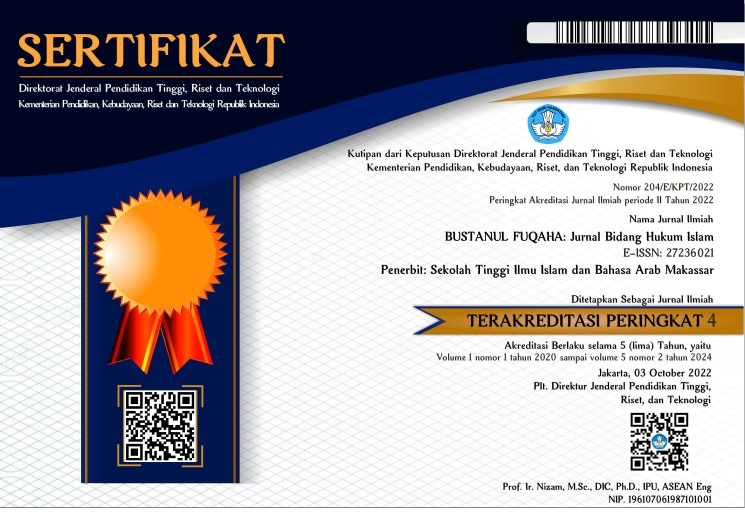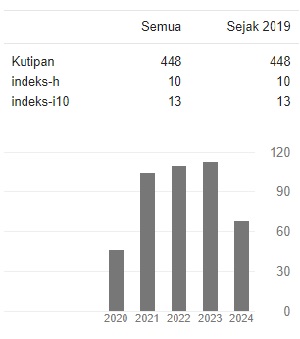Latar Belakang Sosial Lahirnya Mazhab Hambali
DOI:
https://doi.org/10.36701/bustanul.v1i3.204Keywords:
Fiqh, Mazhab, Hambali, HistoryAbstract
The fatwas or fiqh views of scholars in the past were basically born as a reaction to social phenomena that emerged in society. Not only looking at the problems of society in general, but it also responded to government’s or the caliph’s policies in their time. Imam Ahmad bin Hambal is one of the great scholars whose school of thought until this day has developed throughout the world. It is undeniable that the socio-political background was the forerunner of the growth and development of the Hambali School to the digital era today. For this reason, the purpose of this study is to determine the social background of the emergence of the Hambali School and the influence or correlation of social life at the time of Imam Ahmad bin Hambal with his views in the field of fiqh and ushul fiqh. The research method that used is qualitative descriptive approach with content analysis techniques and library research. Apart from that, essentially, this research applied historical and theological approaches. The results showed that social background seemed to influence the emergence of the Hambali School, among others; theological disputes, political conditions, and the development of sciences (dirasah Islamiyah) were quite rapid in his time, it indirectly had implications to his views in the field of fiqh and ushul fiqh. The implications of this research indicate that scholars should maintain the social conditions of their society, particularly in applying the syar'i> propositions, so that the fiqh opinions of Allah ﷻ scholar should not be seen only from a pure discussion of its syar'i> propositions.
Downloads
References
Al-‘Ali Salih Ahmad. (2001). Muqaddimah Kitab Tarikh Baghdad li al-Imam al-Khatib al-Baghdadi, Cet.I; Beirut: Dar al-Garb al-Islami,
Al-H{ulaybi>, Ah}mad bin ‘Abd. al-‘Azis. (1417 H). Us}u>l al-H{ukm ‘Ala> al-Mubtadi’ah ‘Inda Syaikh al-Isla>m Ibn Taimiyah, Jilid I, Cet. I; Doha: Wiza>rah al-Awqa>f wa al-Syu’u>n al-Isla>miyah.
Al-Faqi, Muhammad Hamid. t.th. Muqaddimah Kitab al-Insaf fi Ma’rifah a-Rajih min al-Khilaf li al-Imam al-Mardawi, Cet.II; Beirut: Dar Ihya’ al-Turas al-‘Arabi.
Al-Fattu>h{i, Muh{ammad bin Ah{mad. (1413 H). Syarh{ al-Kawkab al-Muni>r, Cet. II; Mekkah: Mat}a>bi’ Ummu al-Qura>.
Al-‘Ira>qi, ‘Abdurrahi>m bin al-H{usain. (1993). al-Taqyi>d wa al-Ih{ Li Ma> Ut}liqa wa Ughliqa Min Muqaddimah Ibnu al-S{ala>h}, Cet. II; Beirut: Muassasah al-Kutub al- S|aqa>fiyah.
Al-Jauziah, Ibnu Qayyim. (1417 H). I’la>m al-Muwaqqi’i>n ‘An Rabb al-‘An, Cet. II; Beirut: al-Maktabah al-‘As}riyah.
Al-Juhani>, Ma>ni’ bin Hamma>d. (1418 H). al-Mawsu>’ah al-Muyassarah fi> al-Adya>n wal Maza>hib wal Ahza>b al-Mu’a>s}irah, Cet. III; Riya>d}: WAMY.
Al-Naisa>bu>ri, Muslim ibn al-H{ajja>j. (1415 H). al-S}ahi>h Ma’a al-Nawawi, Cet. I; Beirut: Da>r al- Kutub al-‘Ilmiyah.
Al-Qat}t}a>n, Manna>’. (1992). Ta>ri>kh al-Tasyri>’ al-Isla>mi>, Cet. I; Riya>d}: Maktabah al-Ma’a>rif.
Departemen Agama Republik Indonesia. (1418 H). al-Qur’a>n dan Terjemahnya, Medina: Mujamma’ al-Malik Fahd li T{iba>’at al-Mush}af al-Syari>f.
Ibn Kasi>r, Isma>’i>l ibn ‘Umar. (t.th). al-Bida>yah wa al-Niha>yah, Beirut: Da>r al-Ihya> al-Tura>s al-‘Arabi,
Downloads
Published
Issue
Section
License
Copyright (c) 2020 BUSTANUL FUQAHA: Jurnal Bidang Hukum Islam

This work is licensed under a Creative Commons Attribution-NonCommercial-ShareAlike 4.0 International License.














